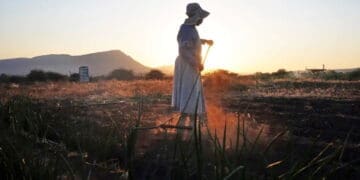South Africa’s entrepreneurs have heard big promises before, but many are cautiously watching the government’s new plan to boost small businesses, unveiled this month in the form of the draft National Entrepreneurship Strategy (NES).
The strategy aims to make it easier for young people and historically disadvantaged entrepreneurs to start and grow their businesses. It focuses on cutting red tape, opening markets, improving access to finance, and strengthening skills through education and mentorship.
Minister in the Presidency Khumbudzo Ntshavheni said the strategy will focus on five pillars which include better education and skills, innovation and technology, easier access to finance and markets, improved regulation, and stronger networks.
According to the Small Business Institute, SMEs account for over 98% of all businesses in South Africa, yet they contribute only about 28% of jobs, which is far below the global average. Many analysts argue that without urgent reforms, the country’s job creation goals will remain out of reach.
For entrepreneurs, the plan sounds good on paper. But the challenges are still biting. Lerato Maseko, a software developer from Soweto, said the lack of funding often kills businesses before they even start.
“I have a working product, but banks won’t even take a meeting with me because I don’t have collateral. If the NES can change that, it will unlock thousands of ideas sitting idle right now,” said Maseko.
The draft plan is open for public comment, and entrepreneurs said this consultation could make or break the policy. “Too often, strategies are drawn up in Pretoria offices without asking those of us hustling every day. If they actually listen this time, the NES could be different,” said Maseko.
In Mpumalanga, agro-processor Thabo Mdluli said regulations are choking entrepreneurs.
“Registering my business took months, and every new license is another obstacle. We waste time fighting the system instead of running our companies. Unless the NES slashes red tape, it won’t mean much,” he said.
Others argue that finance and paperwork are only part of the puzzle. Pretoria-based fashion designer Ayanda Khumalo said exposure and networks are just as critical.
“Talent is everywhere, but opportunities are not. If the NES can link township brands like mine to bigger markets and mentors who’ve walked the road, then it’s worth celebrating,” she explained.
Primrose Thubane, founder of Akwande Business Solution from Kwa Mhlanga, said entrepreneurs’ concerns are valid.
“South Africa has no shortage of ideas or ambition. The problem is systemic, from outdated regulations to slow funding channels; if the NES can align all these moving parts, it could shift the needle on youth unemployment, which is still above 45%,” said Thubane.
While the strategy signals political will, many warn that delivery will matter more than documents. Without proper funding, clear timelines and accountability, the NES risks joining a long list of policies that never moved the needle.
Still, some remain hopeful.
“We don’t want handouts. We just want fair markets, fewer hoops to jump through, and access to finance. If the NES delivers that, small businesses won’t just survive, they’ll transform communities,” said Mdluli.































































